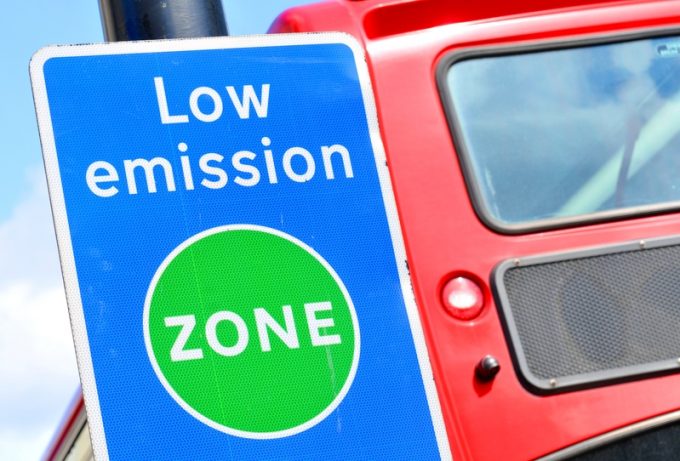NOCC adds third ‘ammonia-ready’ PCTC newbuild orderbook
Norwegian Car Carriers (NOCC) has added a third ‘ammonia-ready’ 7,000ceu LNG-powered ship to its two-vessel, ...
TFII: SOLID AS USUALMAERSK: WEAKENINGF: FALLING OFF A CLIFFAAPL: 'BOTTLENECK IN MAINLAND CHINA'AAPL: CHINA TRENDSDHL: GROWTH CAPEXR: ANOTHER SOLID DELIVERYMFT: HERE COMES THE FALLDSV: LOOK AT SCHENKER PERFORMANCEUPS: A WAVE OF DOWNGRADES DSV: BARGAIN BINKNX: EARNINGS OUTODFL: RISING AND FALLING AND THEN RISING
TFII: SOLID AS USUALMAERSK: WEAKENINGF: FALLING OFF A CLIFFAAPL: 'BOTTLENECK IN MAINLAND CHINA'AAPL: CHINA TRENDSDHL: GROWTH CAPEXR: ANOTHER SOLID DELIVERYMFT: HERE COMES THE FALLDSV: LOOK AT SCHENKER PERFORMANCEUPS: A WAVE OF DOWNGRADES DSV: BARGAIN BINKNX: EARNINGS OUTODFL: RISING AND FALLING AND THEN RISING

Transport for London (TfL) has called air pollution a “public health crisis” and rejected claims from the haulage sector that London’s impending Ultra Low Emission Zone (ULEZ) will have little impact.
Director of city planning at TfL Alex Williams told The Loadstar pollution was leading to thousands of premature deaths a year, hitting the city’s poorest the hardest.
“It is resulting in children with undeveloped lungs, and the ULEZ will significantly reduce the number of polluting vehicles driving within central London,” he said.
“After one year we expect harmful nitric oxide and nitrogen dioxide emissions in central London to reduce by 45%.”
Mr Williams’s comments followed the RHA’s claim of a “massive win” in scuppering Southampton City Council’s plan to introduce a clean air zone.
The proposal had received majority support from a public seemingly aware of the economic ramifications.
Head of urban policy at the FTA Natalie Chapman told The Loadstar the FTA actively supported clean air strategies but questioned the effectiveness of Southampton’s plans.
“In Southampton, the intention was to charge non-Euro VI HGVs, but it left out privately owned vehicles,” she said. “Which is pointless. In that city, 11% of emissions derive from HGVs with more than 50% deriving from privately owned cars – what would it have achieved?”
With implementation of the ULEZ less than three months away, the FTA has again voiced its concern that it could lead to smaller hauliers going out of business.
However, Mr Williams contested this, noting that TfL had been working “hard” with the business community to support ULEZ preparations.
“We have carried out extensive consultations, with many businesses already making the move to comply with ULEZ,” he said. “We have contacted more than 3,000 small businesses and are working with London’s business groups to reach thousands more.
“We are also finalising a £23m van scrappage scheme, which will help small businesses replace their polluting vans with new cleaner ones.”
Ms Chapman said the FTA was pleased to see TfL making the effort, but stressed that £23m was a “drop in the ocean” in terms of what was needed. She stressed that while the scheme applied to businesses with 10 or fewer employees, some such businesses had “massive” fleets, which had become redundant far sooner than expected.
“This is largely due to the failure of Euro V vehicles, which did not meet up to expectations and have seen their residual value drop faster than expected,” Ms Chapman continued.
“Our end goal is clean air, but what we are asking is government to help mitigate the impact on business and make it easier. Our members have been actively involved in upgrading their fleets, but they are hindered by situations outside their control.”
In particular, she pointed to the lack of a secondhand market for Euro VI vans that have only been on the market for two years.
Furthermore, Ms Chapman stressed, members’ efforts to obtain electric vehicles were being hindered by supply failing to meet demand, with lead times as long as 12 months.
Mr Williams reemphasised that TfL was working “hard” to ensure Londoners and business alike are prepared for ULEZ’s introduction on 8 April.
“We believe that our large-scale communications campaign and the support we are offering them will help London’s small businesses be ready. These measures to make the city’s air cleaner will improve the health of all Londoners and make the capital a more attractive and thriving city.”
Comment on this article